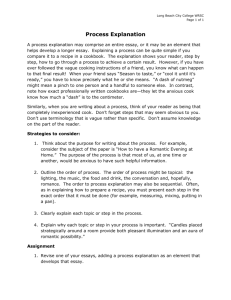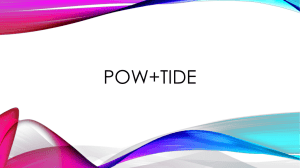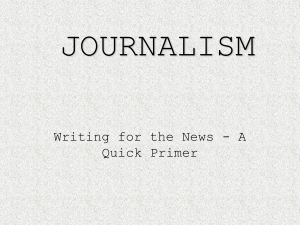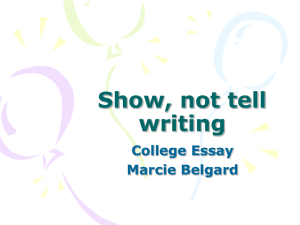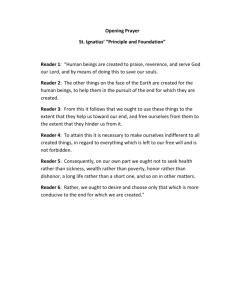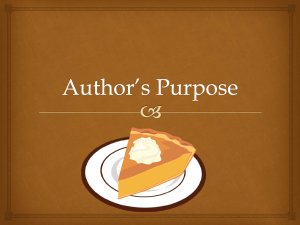History and Historical Analysis
advertisement
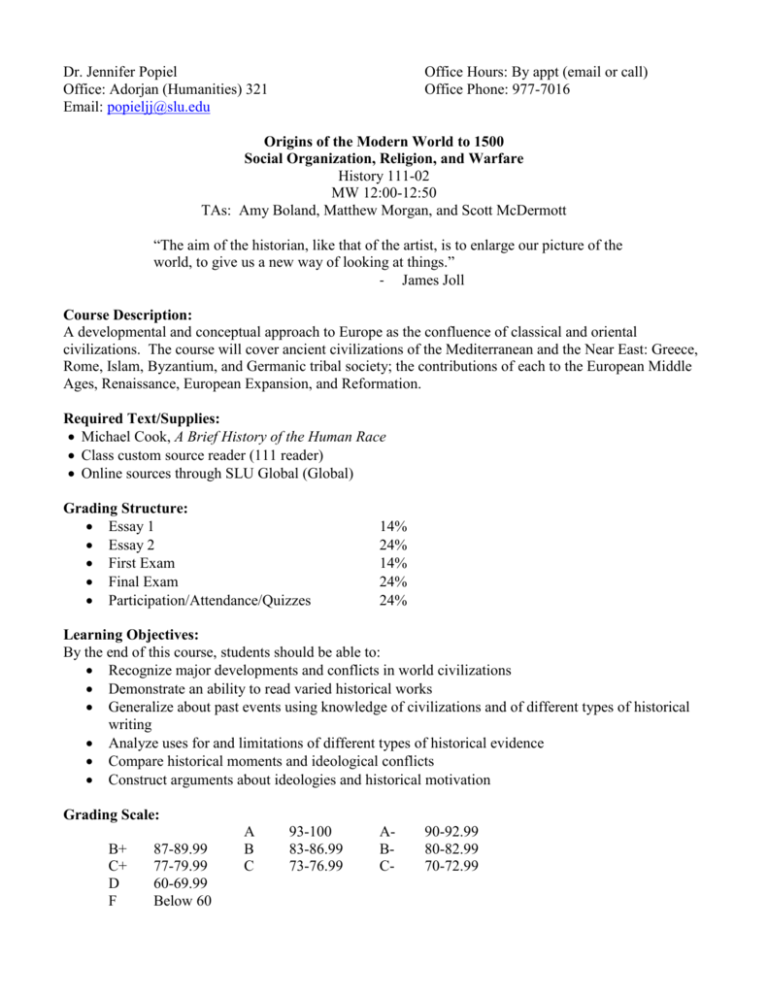
Dr. Jennifer Popiel Office: Adorjan (Humanities) 321 Email: popieljj@slu.edu Office Hours: By appt (email or call) Office Phone: 977-7016 Origins of the Modern World to 1500 Social Organization, Religion, and Warfare History 111-02 MW 12:00-12:50 TAs: Amy Boland, Matthew Morgan, and Scott McDermott “The aim of the historian, like that of the artist, is to enlarge our picture of the world, to give us a new way of looking at things.” - James Joll Course Description: A developmental and conceptual approach to Europe as the confluence of classical and oriental civilizations. The course will cover ancient civilizations of the Mediterranean and the Near East: Greece, Rome, Islam, Byzantium, and Germanic tribal society; the contributions of each to the European Middle Ages, Renaissance, European Expansion, and Reformation. Required Text/Supplies: Michael Cook, A Brief History of the Human Race Class custom source reader (111 reader) Online sources through SLU Global (Global) Grading Structure: Essay 1 Essay 2 First Exam Final Exam Participation/Attendance/Quizzes 14% 24% 14% 24% 24% Learning Objectives: By the end of this course, students should be able to: Recognize major developments and conflicts in world civilizations Demonstrate an ability to read varied historical works Generalize about past events using knowledge of civilizations and of different types of historical writing Analyze uses for and limitations of different types of historical evidence Compare historical moments and ideological conflicts Construct arguments about ideologies and historical motivation Grading Scale: B+ C+ D F 87-89.99 77-79.99 60-69.99 Below 60 A B C 93-100 83-86.99 73-76.99 ABC- 90-92.99 80-82.99 70-72.99 Structure of the Course: Lectures are twice a week on Mondays and Wednesdays. Required discussion sections meet once a week on Wednesday, Thursday, or Friday. Your TA will organize and lead all discussion sections and grade all exams and other work. You will receive a discussion section syllabus in addition to this one. Attendance: College courses require the active participation and cooperation of both faculty and students. There is generally a strong statistical relationship between doing well in history courses and attending classes faithfully. A student who misses class frequently will have a hard time understanding the material, especially in this class, where there are multiple lecturers and no single textbook to provide a narrative. Attendance is required in your discussion section, where you will have the opportunity to ask questions of and interact with your teaching assistant. Multiple absences in section will affect your grade negatively while consistently valuable participation in class discussions will help your final grade. (Please see your discussion section syllabus for more detail.) Your attendance and participation will, along with your section quizzes, count for 24% percent of your grade. Course Requirements: In addition to attendance and participation, requirements for the course include two exams and two essays. Both exams will be essay format and will ask you to analyze sources in the contexts of the problems of civilization that have been discussed in lecture/section. Both essays will be primary source driven and will ask you to describe and analyze how societies dealt with the problems of civilization that they encountered. Failure to turn in assigned essays (both in hard copy AND to turnitin.com!) or to take any part of an exam (not a quiz!) will result in failure of the course, despite your final average grade. All exam questions will be drawn from quizzes, class notes, and assigned course readings. All course material is fair game in any exam; you will almost certainly encounter material from early chapters later in the course. The dates for the exams are noted on this syllabus. Make your travel plans accordingly. No exams will be given at alternate times due to conflicting travel plans. In addition to the above requirements, it is expected that you check your SLU email and SLU Global/Blackboard frequently. Your TAs and I will use them to provide additional information (including lecture outlines), clarify points, and deal with logistical issues that may arise (canceling of class, changing of assignments, etc.). If you do not check your SLU email and SLU Global, you do so at your own peril. All essays must have one inch margins and be typed and double-spaced, in a 12 point proportional font (such as Times New Roman). They must be submitted to Turnitin.com before the hard copy is due. Your essays are not considered to have been submitted until they have been handed in both in hard copy to your TA and electronically to Turnitin.com. If you have a special situation, are confused, need additional help, or just want to chat about the course, please see your TA as soon as possible. S/he can only help you when s/he knows you need help! If you would like to meet with me, you can come to my office during my office hours or call to arrange a mutually acceptable time. I would be happy to meet with you. Technology/Electronic Devices in the Classroom: In order to fulfill the requirements of this course, you MUST have consistent access to a computer with an internet connection, as you will use SLU Global on a regular basis and will have readings that are only accessible online. In addition to readings and assignments, you will find other class resources available for you online. If you are comfortable with technology, you will likely have an easier time in this course than if you are not. This, however, does not mean that technology will serve as an adequate substitute for being present in discussion and lecture. You are permitted to use a laptop to take notes in class, but you should not check-email or surf the Internet during class. In addition, during class you should keep your mobile phone in your bag and muted or off. During all tests and quizzes, all electronic devices must be powered off and placed in your bag. Students with Disabilities Those who have or think that they may have a disability (learning, physical or psychological) are encouraged to contact Mark Pousson at Disability Services, 314-977-8885, in the Busch Student Center, Suite 331, as early as possible in the semester. Students are encouraged to discuss their instructional and accommodation needs with their professors. All student requests for extended time to take examinations in a distraction-free environment must be discussed with the professor a minimum of one week prior to the scheduled date of the exam. Failure to follow the Disability Services procedures could result in a denial of the request. Academic Honesty: Plagiarism and other forms of cheating violate the academic integrity policy and are grounds for failure of this course, suspension, or even dismissal from the university. Plagiarism is using other people’s ideas or work as your own (or reusing your own work without indicating that it has been used to fulfill a requirement in another class). If your essays demonstrate reliance on unattributed sources, the best you can hope for is a failing grade on the assignment, and a failing grade in the course is likely. Conspiring with someone else to cheat is collusion, which is an even more serious violation of academic integrity. Persons found colluding will fail the course, even if their own work was uncompromised. Please do not plagiarize, cheat, or collude to cheat. If you are not sure how to cite other people’s ideas, ask. If you are unclear about what does and does not constitute academic dishonesty, find out. You do not want to fail this course any more than I wish for you to fail. All cases of academic dishonesty, cheating, and plagiarism will be handled per the university’s policies. You should complete all of your assignments independently, unless you are given specific instructions to the contrary. For the specifics of SLU’s Academic Honesty Policy, see: http://www.slu.edu/x12657.xml Classroom Decorum: Please follow these rules to assure a pleasant learning environment for everyone: Do not carry on conversations with others during lecture Do not surf the internet, text, or IM during class Turn your telephone ringer off while in class If you know that you may need to leave early, sit near an exit Do not start packing your things and shuffling papers before the lecture is over If you cannot conform to these expectations, you may be asked to leave. Dates and Topics History and Historical Analysis M Aug 23 Structure and Purpose of the Course, Problems of Civilizations W Aug 25 Evidence and Sources, Pre-History and Archaeology M Aug 30 W Sep 1 Evidence and Sources, Material Culture/Images Evidence and Sources, Primary Sources M Sep 6 W Sep 8 No Classes Held – Labor Day Evidence and Sources, Secondary Sources Early Societies M Sep 13 The “Whys” of Existence: Creation Stories and Myths W Sep 15 Hierarchy and Social Organization: Warfare and Kingship M Sep 20 W Sep 22 Hierarchy and Social Organization: Gender Theism, Justice, and Social Responsibility: Sumerians M Sep 27 W Sep 29 Theism, Justice, and Social Responsibility: Hebrews First Exam: You will be asked to analyze sources dealing with creation and social organization and/or to describe the problems of social organization. Ancient Civilizations M Oct 4 Freedom and Warfare: Greeks W Oct 6 Freedom and Warfare: Greeks M Oct 11 W Oct 13 Course review First Essay Due: In this essay, describe how the problems of social organization that early societies confronted were dealt with in the lifestyles, ethics, religions, and/or philosophies of the ancient civilizations. 4-5 pages, primary source driven. Theism, Justice, and Social Responsibility: Romans M Oct 18 W Oct 20 No Classes Held – Fall Break Theism, Justice, and Social Responsibility: Rise of Christianity Traditional World and Expansion M Oct 25 Expansion and Social Responsibility: Fall of Rome W Oct 27 Religion and Social Responsibility: Fall of Rome M Nov 1 W Nov 3 Theism and Expansion: Islam Viewing Others: Religion M Nov 8 W Nov 10 War and Religion Collide: Crusades Christianity and Inquisition M Nov 15 W Nov 17 Disease and Social Reorganization, I Second Essay Due: In this essay, describe how the organization of traditional societies developed and was challenged by the lifestyles, ethics, religions, and/or philosophies of the increasingly global world. Be sure to include how Cook’s Brief History demonstrates or contests the trends that we have discussed in class. 5-6 pages, primary source driven, may be a development from the first essay. Disease and Social Reorganization, II M Nov 22 W Nov 24 Individualism and Social Roles No Classes Held, Thanksgiving Break M Nov 29 W Dec 1 Expansion and Exchange: China and Europe Explore, I Expansion and Exchange: China and Europe Explore, II M Dec 6 Course Wrap-Up W Dec 8 Final Exam, noon-1:50 (lecture hall). You will be asked to use sources dealing with religion, warfare, or social organization to analyze the trajectory of civilization that we have studied over the semester. Readings, by week Week of August 23 What Historians Do (Global) Cook, Brief History of the Human Race, Chapter One “Doing History,” Encounters in World History, pages 3-14 (111 reader, pages 1-20) “Dawn of the City” (111 reader, pages 31-33) Archaeology Readings (Global) Week of August 30 Cook, Brief History of the Human Race, Chapter Two “Prehistory of Warfare” (111 reader, pages 38-41) “Writing Gets a Rewrite” (111 reader, pages 42-44) “Cradle of Cash” (111 reader, pages 49-54) Wright, “First Americans” (Global) Week of September 6 Cook, Brief History of the Human Race, Chapter Three McNeill, “Process of Civilization” (Global) Taking Sides, “Does Alexander the Great Deserve His Reputation?” (111 reader, pages 58-75) “Doing History,” Encounters in World History, pages 14-30 (111 reader, pages 20-30) Week of September 13 Cook, Brief History of the Human Race, Chapter Four Genesis 1:1-3:19, 6:9-9:16, and Matthew 26:26-28:20 (Global) Iroquois creation story in Colin Calloway, The World Turned Upside Down (Global) Commentary for Bible readings: http://www.bible-researcher.com/neb.html (Global) “Creation-Origin Myths” Encounters in World History, pages 31-60 (111 reader, pages 76-87 and 91-105) “Kingship and Authority,” Encounters in World History, pages 61-81 (111 reader, pages 106-120) Week of September 20 Cook, Brief History of the Human Race, Chapters Five and Six Taking Sides, “Was Sumerian Civilization Exclusively Male Dominated?” (111 reader, pages 127144) Selections of Mesopotamian Laws (Global) Muller, “Freedom in the Ancient World” (Global) Lesko, “Women of Egypt and the Ancient Near East” (Global) Week of September 27 Cook, Brief History of the Human Race, Chapters Seven and Eight Genesis 12 to Genesis 25, Exodus 1 to Exodus 6 (Global) “Individual Ethics and Social Responsibility,” Encounters in World History,” (111 reader, pages 145-149, 179-183) “It Happened Only Once in History” (Global) Week of October 4 Cook, Brief History of the Human Race, Chapter Nine Thucydides, Plutarch, Lysistrata, and the Melian Dialogue (Global) “Individual Ethics and Social Responsibility,” Encounters in World History (111 reader, pages 160-168) “Women in the Ancient World,” Encounters in World History (111 reader, pages 196-203) “Empires, War, and Order,” in Encounters in World History (111 reader, pages 222-226, 235-238) Hanson, “No Glory That Was Greece” (Global) Fleischman, “Classical Athens” (Global) Taking Sides: “Were the Spartans Fighting for a Compromised View of Freedom?” (111 reader, recommended, pages 184-195) Week of October 11 Cook, Brief History of the Human Race, Chapter Ten “Women in the Ancient World,” Encounters in World History (111 reader, pages 203-207) “Empires, War, and Order,” Encounters in World History (111 reader, pages 238-244) Cartledge, “Hunting for a New Past” (Global) What If? “Conquest Denied” (Global) Week of October 18 Cook, A Brief History of the Human Race, Chapter Eleven Primary sources dealing with Romans, Christianity and Martyrdom (Global; see also questions and commentary in 111 reader, pages 213-218) Turning Points, “Church Pushed Out on Its Own” (Global) Week of October 25 Primary sources dealing with Emperors and Huns and Religion (Global) What If? “Not By a Nose” (Global) Taking Sides, “Internal Factors Responsible for the Fall” (111 reader, pages 248-269) Week of November 1 Primary sources dealing with Islam (Global) Turning Points: “Coronation of Charlemagne” (Global) Primary sources dealing with Franks and Clovis (Global) Turning Points: Great Schism (Global) Week of November 8 Cook, A Brief History of the Human Race, Chapter Twelve Primary sources dealing with the Crusades (Global) Taking Sides: Could the Crusades be considered a Christian Holy War? (111 reader) Primary sources dealing with Cathars, Waldensians, and Inquisition (Global) Grand Inquisitor, Brother’s Karamozov (Global, recommended) Week of November 15 Cook, A Brief History of the Human Race, Chapter Thirteen Selections from “Illness and Therapy in the Plague Years,” Encounters in World History (111 reader) Primary sources on Fourteenth-Century Calamities (Global) Mee, “Mysterious Disease” (Global) Week of November 22 Taking Sides: Did Women Benefit from the Renaissance? Primary sources on the Renaissance and Society (Global) Renaissance Art (Global) Week of November 29 Axtell, “Colonial America Without the Indians” (Global) “Expanding Global Encounters,” Encounters in World History (111 reader) Taking Sides: Did China’s Worldview Cause the Abrupt End of Its Voyages of Exploration? (111 reader) Winchester, “After Dire Straits, an Agonizing Haul Across the Pacific” (Global) McNeill, “Far West’s Challenge to the World, 1500-1700” (Global) What If? “Chinese Discovery of the New World” (Global) Week of December 6 Cook, A Brief History of the Human Race, Chapter 14
